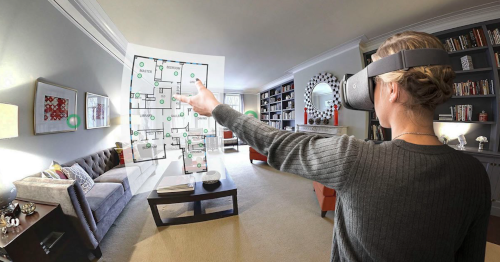You are viewing our site as an Agent, Switch Your View:
Agent | Broker Reset Filters to Default Back to ListHow Real Estate Agents Can Use Virtual Reality to Scale their Business
May 22 2023
 Virtual reality (VR) is revolutionizing the way we interact with the world around us, and the real estate industry is no exception.
Virtual reality (VR) is revolutionizing the way we interact with the world around us, and the real estate industry is no exception.
As the world becomes increasingly digital, it's crucial for real estate agents to adapt and incorporate VR into their business strategies to stay competitive. In this post, we'll explore how real estate agents can use virtual reality to scale their real estate business and provide an immersive experience for their clients.
Providing immersive experiences
One of the most significant advantages of using VR in real estate is the ability to provide an immersive experience for potential buyers. Clients can tour properties virtually using VR technology, which enables them to do so whenever and from any location in the world. This is especially useful for buyers from other countries or states who are unable to attend live showings.
A real estate brokerage company like Redfin, for instance, recently introduced a virtual home-buying program that enables customers to explore homes in 3D, virtually tour the property, and even measure the dimensions of individual rooms. Redfin has been able to close deals with clients who are unable to attend in-person showings thanks to technology, which has also helped them differentiate themselves from competing real estate firms.
More interactive approach
By enabling real estate agents to showcase properties in a more interactive and interesting way, VR can also aid them in growing their business. VR technology allows real estate agents to create immersive experiences that give clients a better sense of the property's layout, features, and overall vibe rather than just showing them photos and videos of the properties.
For instance, the company Matterport, which produces 3D virtual tours of properties, has assisted real estate agents in creating more interesting property listings. Customers can explore the property in a 3D model, view each room from various perspectives, and get a better idea of how the property flows overall. This promotes quicker sales by assisting clients in making better-informed decisions about which properties to pursue.
Save time and money
VR technology can also help real estate agents save time and money. In conventional real estate, agents may invest countless hours preparing for showings, driving clients to properties, and responding to inquiries about properties. Real estate agents can now conduct virtual showings and give clients all the information they require without ever leaving the office thanks to VR technology.
For instance, real estate agents have been able to save time and money by using virtual tours of properties created by VRX Studios, a business that develops virtual reality experiences for the hospitality and real estate industries. These virtual tours give customers a thorough overview of the property, enabling them to decide whether or not to pursue the property with greater knowledge. Less time will be wasted traveling to properties that might not be a good fit for the client.
Improve operations
In addition to the benefits for clients, VR technology can also help real estate agents improve their internal operations. Real estate agents, for instance, can create more precise floor plans with the aid of VR technology, which will help them market properties more successfully. Additionally, it may enable agents to work with other team members more effectively, facilitating information sharing and project collaboration.
For example, the 3D floor plan and virtual tour company Planitar has assisted real estate agents in streamlining their internal procedures. Real estate agents can produce more effective marketing materials that highlight the special features of a property if they are given precise 3D floor plans. Other team members, such as photographers and marketers, can also access the 3D floor plans, facilitating better collaboration.
In conclusion, virtual reality technology has the potential to revolutionize the real estate industry. By providing clients with an immersive experience, helping real estate agents showcase properties more effectively, saving time and money, and improving internal operations, VR technology can help real estate agents scale their business and stand out from the competition. As the world becomes increasingly digital, real estate agents who incorporate VR technology into their business strategies will have a competitive advantage in the marketplace.
To view the original article, visit the Transactly blog.









